“Gladiator II” Screenwriter David Scarpa on the Herculean Task of Writing a Worthy Sequel
It’s been a long time coming, but the sequel to Ridley Scott’s 2000 epic, which won the Oscar for Best Picture, opens in theaters nationwide on November 22. Starring Oscar nominee Paul Mescal (Aftersun), Pedro Pascal (The Last of Us), the iconic Denzel Washington, and original cast member Connie Nielsen, Gladiator II finally came to fruition thanks to the script from David Scarpa, who’d previously penned Scott movies All the Money in the World and Napoleon.
Filmed mainly in Malta and Morocco, Gladiator II harnessed a crew of 1,200 craftspeople to tell the story of Mescal’s Lucius. Captured in North Africa and brought to Rome, Lucius proves his mettle in the arena, fighting as a gladiator for the amusement of deranged twin-rulers portrayed by Joseph Quinn and Fred Hechinger. Political chicanery and bloodshed ensue.
Speaking from his home in Los Angeles, Scarpa talks about devising action sequences, collaborating with master filmmaker Scott and cracking the sequel code with his core idea for Gladiator II. Fair warning, gladiators—spoilers below.
They’ve been trying to make a Gladiator sequel practically since the first one came out in 2000. Why did it take so long?
The challenge has always been: How do you make a sequel to a movie where the main character [Russell Crowe’s Maximus] and the antagonist [Joaquin Phoenix’s Commodus] are both dead?
The answer apparently came when you got a call from Ridley Scott. How did that conversation go?
He said, “We want to talk to you about G2.” What’s G2? Oh, Gladiator 2! So, of course, I jumped in. The only real mandate was that they wanted the story to focus on Maximus’ son, Lucius.
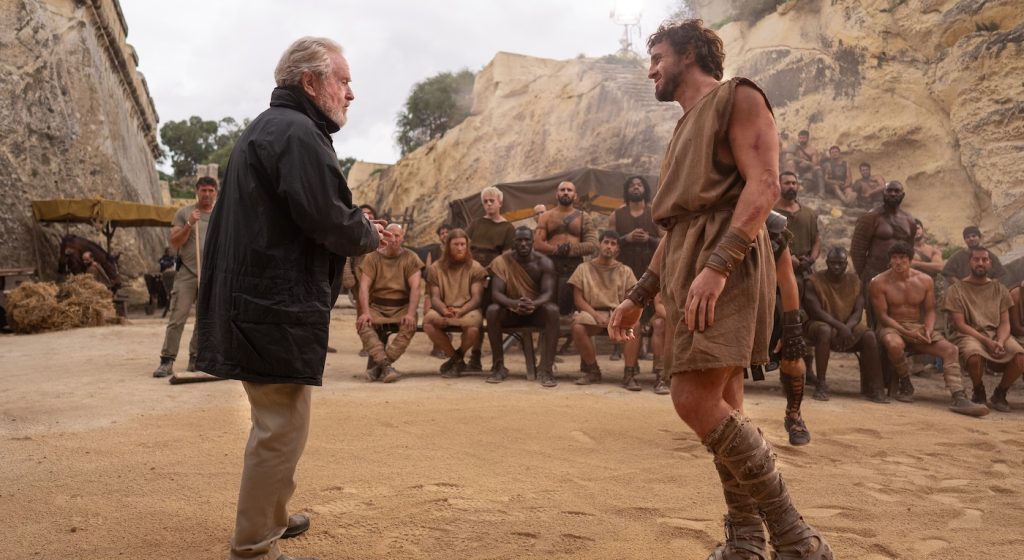
Where did you go from there?
The first movie starts with Maximus as a Roman general fighting against barbarians, so let’s start this movie with his mirror image, his opposite number, Lucius, as a barbarian fighting against Romans. Lucius has rejected all the values of his father. What is the story that brings Lucius back to a place where he’s able to embrace his father and embrace Roman virtues? That’s the core question that the rest of the movie is built around.
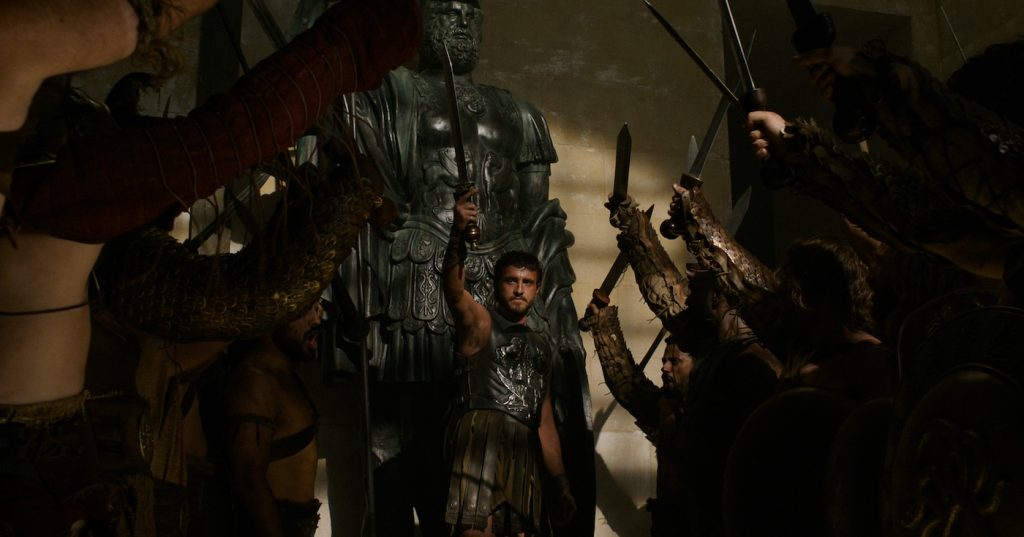
Obviously your pitch went over well.
I wrote an email about a page long: “Here’s my take.” I presented it to Ridley, the producers, and the studio, and they liked it.
Then what happened?
Then I went off and did my first draft.
And then they made the movie?
My first conversation happened before the COVID pandemic, which tells you how long this process was because it’s not like you present the pitch, then you go write it, and then they shoot it. The story changed considerably. My early version started in Londinium—the Roman version of London. Does Lucius have a wife and a kid? Blah, blah, blah—there were all kinds of alternate versions.
So, a lot of back and forth?
Exactly. The question is not whether you can write a movie, but can you write a movie, have people come in and blow it up, and rebuild it, blow it up again, and rebuild it? The real question is, can you do it 15 times in a row instead of just doing it once?
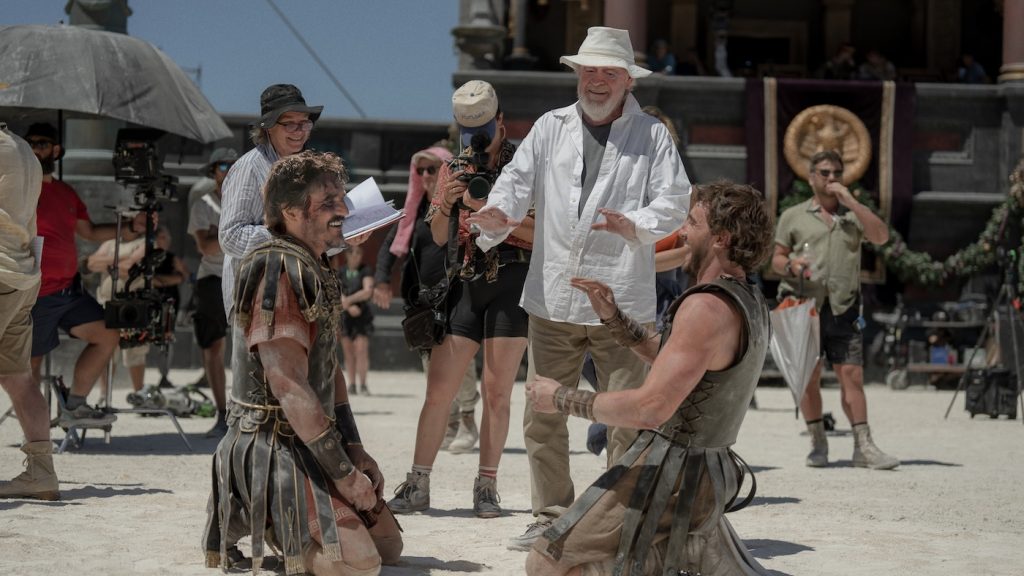
SPOILER ALERT
Lucius is captured by Pedro Pascal’s General Acacius and sold to Denzel Washington’s Emperor Macrinus, who turns out to be a fascinating adversary. How did you come up with his character?
It took us a long time to realize that Macrinus is the embodiment of cynicism. He’s embraced nihilism, whispering into Lucius’s ear that it’s all a fraud—and he has a point.
The movie kicks off with an epic battle sequence set on the shores of North Africa—ships, swordfights, catapults, arrows, and carnage—and that sets the bar for many more fantastic action sequences.
But what’s crucial is that each spectacle is never just a set piece; it also has to advance the conflict between characters. I think that’s where a lot of movies go wrong: If you have set pieces just for the sake of having set pieces, it winds up feeling empty. The visual stuff for me was really secondary to the question of how to cook up an action scene that will drive home the drama, whether it’s character, theme, or emotion. That’s really the main job.
SPOILER ALERT
Gladiator II features a jaw-dropping set piece in which the coliseum is flooded with water and battleships are surrounded by sharks. Sharks circle the ships and eat men unlucky enough to fall into the water. Is that sequence rooted in historical fact?
Oh yeah, in terms of filling the coliseum with water and staging naval battles, they did do that.
What about the sharks?
Originally I think I wrote eels, of all things, but I also wrote in some sharks. Ridley took out the eels but he liked the sharks. In the coliseum, they had every conceivable kind of animal, which is what made ancient Rome so barbaric. All day long, they had animals killing animals, everything you can imagine for the sake of entertainment. So all that stuff [in the movie] is totally within the realm of what they actually did.
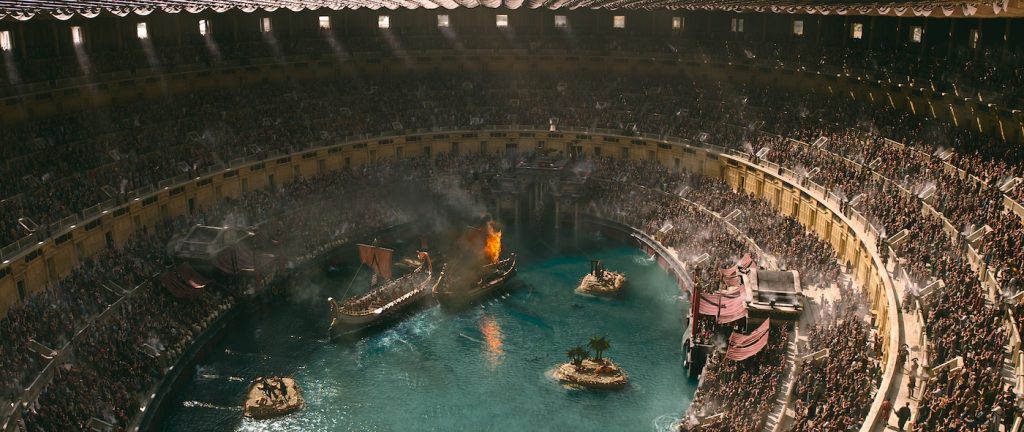
There’s a revealing moment in Gladiator II when Lucius quotes a poem by Virgil, the great Roman poet. What’s that about?
Lucius is viewed as a barbarian, but in fact, he’s been educated in the Roman classics. His masters treat him like an animal and he comes back at them with poetry that they don’t even know. It shows that Lucius is the real noble, the real sophisticate and they are not. There’s also the idea that Lucius invokes this poetry almost like a curse.
Do you know your Virgil?
I do not [laughing]. The crucial thing is to make sure that your writing reflects the mindset of people living at the time. Today, there’s therapy talk, trauma talk, and that simply was not the framework then. Romans lived in the world of gods and virtue and destiny, and also vulgarity. It was important to make sure the lexicon of the movie came out of the way they saw things.
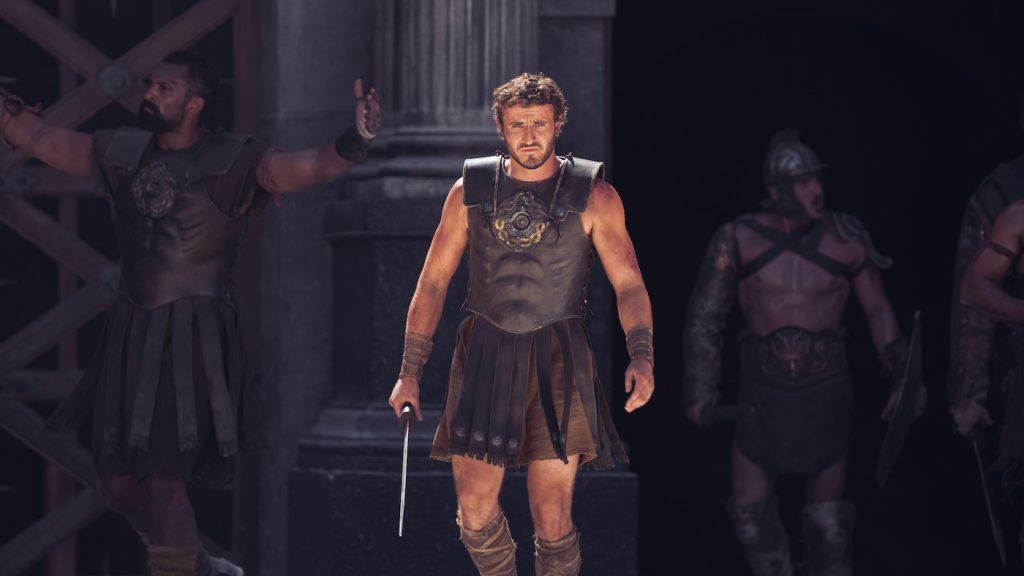
Ridley Scott sometimes presents himself as a kind of gruff fellow. Is he intimidating to work with?
Ridley does not suffer fool gladly, and if you don’t know what you’re talking about, you’ll get in trouble quickly. Sometimes, having conversations with Ridley Scott is like walking into the arena yourself and fighting against a great Roman warrior [laughing]. You do have to have confidence but if you have a strong case to make, at least you’ll get a hearing. Ridley has great taste, and that’s what you’re appealing to: his taste.
Ancient Rome was run by rulers who distracted their citizens with mean-spirited spectacles. In writing Gladiator II, did you see any parallels to contemporary America?
In the last couple of years, there has been, I think, a generational questioning of America itself as a society. Is it foundationally corrupt? If Ancient Rome is a proxy for America, and in Gladiator II, a young person views his world through the lens of imperialism or corrupt leaders or bread and circuses, then the question becomes: “What is the thing that’s worth preserving?” That’s the parallel for me. Our movie follows Lucius, who has renounced this fallen world and finds his way back to it in order to save it.
Gladiator II is in theaters on November 22.
Featured image: Paul Mescal plays Lucius in Gladiator II from Paramount Pictures.



